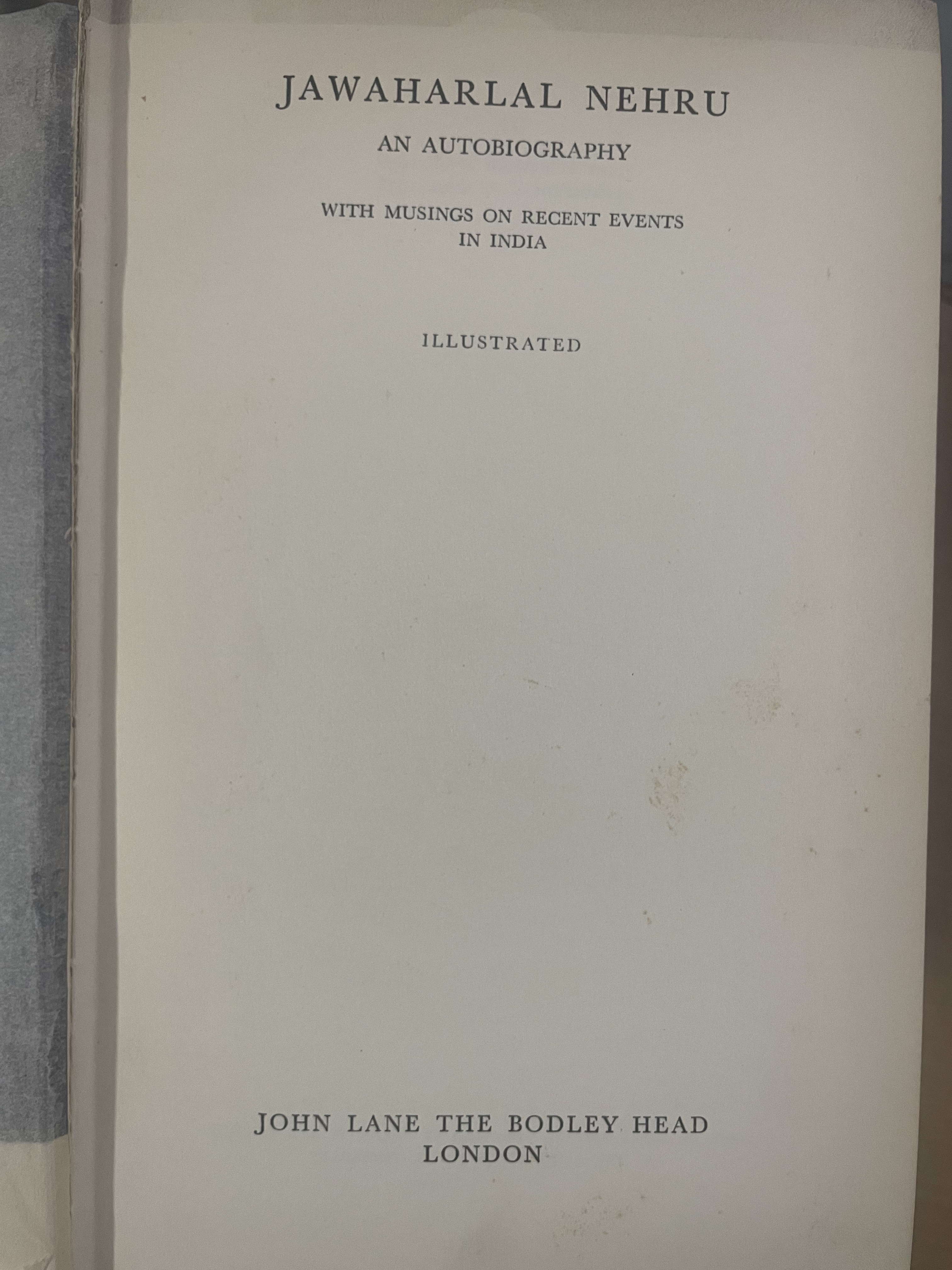Jawahar Lal Nehru a Autobiography

About
Summary
Exquisite
TOC
Details
Related
URL
Images
Overview
Jawaharlal Nehru's An Autobiography, also known as Toward Freedom, is an autobiographical work written between June 1934 and February 1935 while Nehru was imprisoned, prior to his becoming the first Prime Minister of India. Published in 1936, the book offers insights into Nehru's life, his role in India's independence, and his ideologies.An Autobiography spans 68 chapters and 672 pages, detailing Nehru's life up to February 1935, when he was 45 years old. In the preface, Nehru states his aims: to constructively occupy his time, review Indian events, and engage in self-questioning within his personal account. He clarifies that his primary goal was his own mental growth, addressing his writing to his fellow countrymen rather than a foreign audience.
The book begins with Nehru's ancestral history, tracing his family's migration from Kashmir to Delhi in 1716 and their subsequent settlement in Agra after the 1857 revlt. Chapter four discusses the English influence on Nehru through Harrow and Cambridge. Written during his wife Kamala's illness, the autobiography closely revolves around his marriage. Nehru's work includes an epilogue dated February 14, 1935, and a postscript added in October 1935 while in Badenweiler, Schwarzwald, where his wife was receiving treatment.
Importance of Book
An Autobiography is significant as both Nehru's life story and a piece of literature. It reveals Nehru's charismatic personality and his belief in human values, individual dignity, an equalitarian social order, and national unity. The book shares Nehru's political, social, moral, and economic experiences, reflecting his comprehensive vision for India's growth.
Walter Crocker, an Australian diplomat and writer, noted that the autobiography's impact was such that Nehru would be renowned for it even if he hadn't become Prime Minister. The book uses excellent English and presents a panorama of contemporary social and political life, offering glimpses into Indian history and culture.
Key Themes
Nationalism: Nehru describes nationalism as an anti-feeling that thrives on hatred against foreign rulers.
Cultural Identity: Nehru portrays himself as a blend of Eastern and Western cultures, feeling out of place in both. He recognizes India's profound influence on him, yet feels like an exile in his own country at times and a stranger in the West.
Personal and National History: The book intertwines Nehru's personal history with India's national history, illustrating the evolution of his personality within the context of India's struggle for independence.
Modernization of India: As Prime Minister, Nehru aimed to modernize India scientifically, despite its cultural and religious differences. His efforts significantly modernized Hinduism, granting equal rights to women.
Scientific Humanism: Instead of religious faith, Nehru advocated scientific humanism, a synthesis of humanism and scientific spirit. This concept promotes practical idealism for social betterment.
Cultural Significance
An Autobiography holds substantial cultural significance by providing insights into the pre-independence era in India. The book captures the political realization of a nation on the brink of freedom and its battle for independence. Nehru's work reflects his understanding of Western history and its universal significance, shaping his vision for independent India.
Effects on Society
Shaping Modern India: Nehru's vision, articulated in his writings, aimed to direct economic development, establish a constitutional secular government, create economic opportunities, and maintain sovereignty through non-alignment during the Cold War.
Inspiring Generations: Nehru’s literary contributions have molded a generation of Indians and inspired people from other countries.
Promoting Humanism: Nehru’s advocacy for scientific humanism has influenced the country to focus on ethical, social, and humanitarian values, promoting practical idealism for social betterment.
Social Reforms: Nehru's work as Prime Minister led to the modernization of Hindu practices, granting women equal rights and fostering a more egalitarian society.
Guiding Principles: Nehru shared innovations and experiences in political, social, moral, and economic development, guiding India towards all-around growth.
Conclusion
An Autobiography by Jawaharlal Nehru is a comprehensive account of his life, thoughts, and vision for India. Written during his imprisonment, the book provides valuable insights into Nehru's personal and political evolution. It reflects his commitment to humanism, social justice, and the modernization of India, making it a significant work in both literature and history. The book’s cultural significance lies in its depiction of pre-independence India and its impact on shaping the nation’s identity. Nehru’s ability to blend personal reflections with national events offers a unique perspective on the making of modern India and its place in the world.
Title
Jawahar Lal Nehru a Autobiography
Author
Jawahar Lal Nehru
Name of Publisher
John Lane The Bodley Head London
Publish Date
1936
Subject
First Reprinted
Vintage
1901-1947
Number of Pages
618
Category
Nehru
Sub Category
Biography
Rarity
RARE
